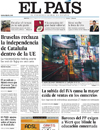
“The EU rejects Catalonian independence within the EU,” headines El País, revealing a letter sent on October 4 from Viviane Reding, Vice-President of the European Commission, to the Spanish government. The Commissioner for Justice and Fundamental Rights states that she is “favourable towards the thesis” outlined in a letter addressed to her by the Spanish Secretary of State for European Affairs.
Faced with the call for independence in Catalonia, Iñigo Méndez de Vigo invoked Article 4.2 of the Treaty on European Union, which stipulates that the EU “must respect the territorial integrity of its members” and “cannot recognize a unilateral declaration of independence by a part of a member state.” Reding’s response: “I fully concur with the analysis of the European constitutional framework” developed in the letter.
The revelation of this support from Brussels for Madrid comes in the midst of the campaign for the regional elections to be held 25 November in Catalonia, which could be followed by a referendum on independence for the region within four years. For the Madrid daily, the message comes as —
... a cold shower for nationalist fevers [...] There is no question of toying with the voters to convince them that the EU would give a delighted welcome to a party that broke away unilaterally from Spain.
El País also criticises the possibility that Catalonia could gain independence from Spain in 2020, as laid out in the electoral programme of the CiU (centre-right nationalist) party of Artur Mas, president of the regional government —
Such a prolonged delay can be explained by the nationalists’ dawning recognition of the hurdles that await their adventure to have Catalonia accepted, just like that, as a state in Europe.
In its bid to see off an independence push by Catalonia, Madrid is also making clear its lack of enthusiasm for Scottish secession, notes the Financial Times. Ahead of Scotland’s 2014 independence referendum, Alex Salmond, Scotland’s first minister, has claimed that Scotland would automatically become a member of the EU if it ceded from the UK. However, José Manuel García-Margallo, the Spanish foreign minister, last week said an independent Scotland would have to “get to the back of the queue” for EU membership —
It can’t take its international existence for granted . . . It would have to apply for membership. You can’t expect them to walk into EU meetings the day after it gains independence. The Commission, the Council and the European Parliament will not accept that.
Was this article useful? If so we are delighted!
It is freely available because we believe that the right to free and independent information is essential for democracy. But this right is not guaranteed forever, and independence comes at a cost. We need your support in order to continue publishing independent, multilingual news for all Europeans.
Discover our subscription offers and their exclusive benefits and become a member of our community now!











